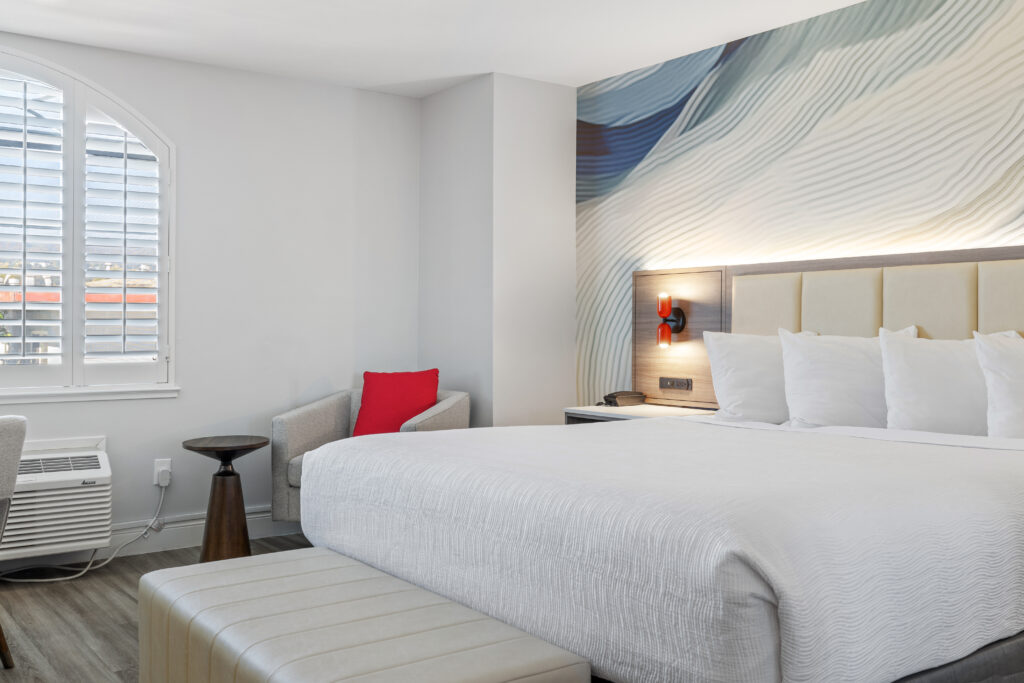
How One Hotelier Converted Two Franchise Properties Into Profitable Independent Hotels
By Nicole Needles
In the bustling hospitality landscape, Prativ Patel stands out as a beacon of entrepreneurial success. Having initially franchised both a Super 8 and a Howard Johnson by Wyndham, Patel boldly transitioned to independence when his franchising contracts expired.
Through astute management and a keen eye for profitability, he transformed these properties into two thriving independent hotels near San Francisco’s airport: Hotel Aura, which he converted in 2016, and Hotel Skye, which opened its doors in 2024.
Today’s Hotelier sat down with Patel, an AAHOA Lifetime Member, to discuss his journey from “eight to great.” Patel shared insights on the factors that drove his decision to go independent, the transition process, and how flying solo put him more in control of his own profitability.

How did you get started in the industry?
Like many others in our industry, I have a similar story. I came to the U.S. with a background in chemical engineering. My in-laws had been in the hotel industry for a long time, and I had a choice to either pursue my engineering career or join the family business. I chose hospitality and never looked back.
I arrived in June of 2001, and just a few months later, 9/11 happened. It was a tough time, but those challenges provided me with a valuable learning experience. As an engineer, I’ve always had a mindset of simplifying processes – whether for myself, my front desk staff, or my operations as a whole. That mindset has stayed with me throughout my career.
In 2003, my wife, Nilam, and I bought our first property, a Super 8. We’ve been in the business ever since. We have two daughters – our oldest is in college, and our youngest is in high school. Initially, we lived in a small apartment behind the Super 8, and we ran the hotel 24/7. Both my daughters were born in that little place. They were always running around in the apartment and trying to sneak into the office – that’s part of growing up in a hotel. Over the years, my wife has been as involved as I am. We both made this place what it is today.
You were deeply involved with franchise brands, including serving on the boards for Howard Johnson and Super 8. What benefits did you gain from that experience?
I was always a strong operator, and both Super 8 and Howard Johnson recognized that. They wanted me on the board to bring fresh ideas and insights. Our Super 8 property was one of the best-performing hotels, and we even won Property of the Year in 2016. Because I was ahead of the curve – implementing upgrades like 55-inch TVs before they became standard – franchise leadership valued my perspective.
For me, the experience was equally valuable. I learned a lot from other board members, gained insights into the brands’ long-term strategies, and understood how decisions at the corporate level affected franchisees. From 2012 to 2018, Super 8 had some of its strongest years, and I was fortunate to be involved in that growth.
When did you make the transition to an independent model?
The idea had been on my mind for years. In 2016, when my contract with Howard Johnson expired, I made my first independent conversion, rebranding the property as Hotel Aura. That experience gave me confidence in the independent model.
By 2019, I was ready to make the same transition with my Super 8 property, but since I was still serving on the franchise board, I felt it would be unfair to leave at that time. Then COVID hit, and like everyone else, I had to reassess everything. My contract with Super 8 was set to expire in 2023, and I saw it as the right opportunity to go independent without the burden of liquidation damages.
What factors influenced your decision to leave the franchise model?
There were two major factors.
First, I spent a lot of time talking to guests at the front desk. I asked them why they chose my hotel – was it because of the brand? Overwhelmingly, the answers were: Location, reviews, and price. Especially with my airport location and international clientele, many guests weren’t even familiar with the franchise brand name. That showed me the brand wasn’t necessarily driving business to my hotel.
Second, I analyzed my reservation sources. About 80 to 85 percent of my bookings came from third-party sites like Expedia and Booking.com. Meanwhile, the franchise pushed its loyalty program, but the cost of participation often outweighed the benefits. For example, if a rewards booking required a 10 percent discount for members and an additional five percent fee for the program, I was essentially giving away 15 percent – the same or more than what I paid to third-party sites.
When I put all of this together, it became clear: I could achieve the same level of success – or greater – without the restrictions and fees of a franchise.
What advice would you give to hoteliers considering going independent?
Look where your reservations come from. If 80 percent or more of your bookings come from third-party sites, you don’t need a brand. That franchise fee could be reinvested elsewhere to drive even more profitability.
Run your independent hotel with the same discipline as a franchise. Just because you don’t have corporate oversight doesn’t mean you should cut corners.
Basic hospitality principles still apply: Clean rooms, good service, and competitive pricing. Too often, owners overthink things – debating whether to offer omelets or bacon at breakfast – when, in reality, guests care most about a comfortable bed and a good shower.
Consistency is key. At Hotel Aura, even though I converted in 2016, guests still comment on how well-maintained the property looks. That’s because we keep up with renovations and cleanliness, just as we would under a franchise.
For anyone considering going independent, I’d say: Analyze your reservation sources, know your guests, and commit to maintaining high standards. If you do that, you won’t regret making the switch.
Beyond cost savings, what other advantages have you experienced as an independent hotelier that have helped maximize profitability?
One key advantage is the ability to work closely with third-party booking sites. As an independent, I can collaborate directly with market managers from platforms like Expedia and Booking.com. This allows me to update promotions, adjust content, and change photos in real time. In contrast, when working through a franchise, those updates have to go through brand approval, which can take weeks. That kind of flexibility makes a big difference.
That said, going independent isn’t for everyone. Location plays a huge role. If you’re in a market where a franchise brand brings in significant business, then it might make sense to stay with a franchise. The most important factor is understanding where your reservations are coming from and making the best decision for your business.
How has your involvement with AAHOA impacted your career and your success as a hotelier?
AAHOA has always been a valuable resource for networking and education. I’ve attended AAHOACON over the years, and the trade show is particularly beneficial for connecting with vendors. That’s actually how I discovered vendors like Avendra, which I use at both my hotels, and Curve Hospitality, a Silver Industry Partner – I’ve relied on their services, including when I designed Hotel Skye.
What other strategies have you used to differentiate your independent hotels in terms of branding and marketing?
One of the biggest advantages of being independent is the ability to invest in targeted marketing. Instead of paying franchise fees, I can allocate funds toward digital advertising. I work with Sabre, which offers a range of marketing tools, and I also invest in meta-search advertising on Google.
When you’re with a franchise, you assume they’re handling all your marketing, but that’s not always the case. You still have to find ways to stand out. For example, if you’re listed on the second or third page of Expedia, potential guests might never see your property. But you don’t have the budget to boost that because you’re already spending with the franchise fees and so forth.
Now, by working directly with market managers and adjusting commission rates, I can improve my hotel’s ranking and visibility. The more bookings I get, the more these platforms will organically promote my property.
You’ve been operating Hotel Skye for over a year now. What has been your proudest moment so far?
Seeing my vision come to life. When I walk into the rooms and they look exactly as I imagined, that’s incredibly satisfying. I’ve done this before with Hotel Aura, but every project is different. This time, it was more challenging to find contractors and resources, but the final product turned out just as I had hoped.
What’s next for you? Do you have plans to expand?
I take a different approach than some of my colleagues who are focused on continuous growth. For me, it’s about balance. I have two daughters, and I want to be present for them. That’s why I made the decision to buy a home in 2013 – I didn’t want them growing up in a hotel. Now, I focus on maintaining what I have and ensuring my properties operate at a high level.
The pandemic was a lesson for all of us. Times won’t always be good, and chasing expansion for the sake of it isn’t my goal. Instead, I want to create meaningful guest experiences and provide real value. When guests spend their hard-earned money to stay at my hotel, I want them to feel like they made the right choice. That’s what truly matters to me.

Leave a Reply